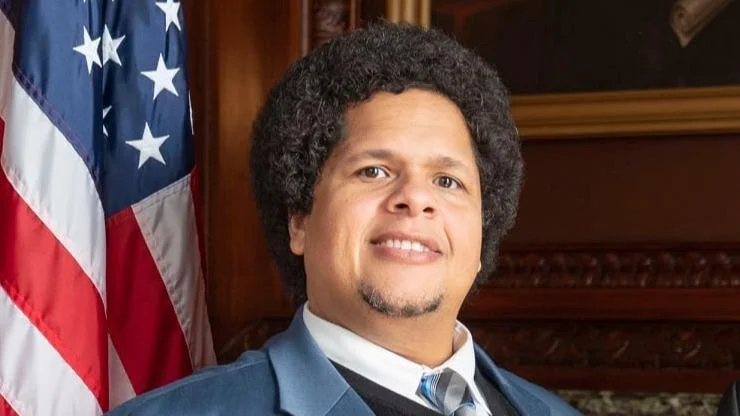Marc Julian Bradley, Wisconsin State Senator for 28th District | Official Website
Marc Julian Bradley, Wisconsin State Senator for 28th District | Official Website
According to the Wisconsin State Legislature's official website, the bill was described as follows: "the use of artificial intelligence or other machine assisted translation in court proceedings and of telephone or live audiovisual interpretation in criminal trials. (FE)".
The following is our breakdown, based on the actual bill text, and may include interpretation to clarify its provisions.
In essence, this bill allows the use of artificial intelligence or machine-assisted translation, alongside or as a replacement for human interpreters, in various Wisconsin court proceedings, which includes civil, criminal, municipal, and administrative contested cases. It permits interpreters to work remotely through telephone or live audiovisual means in criminal trials, a change from current regulations that restricted remote interpretation to non-trial settings. The implementation of machine translation is permitted without requiring a waiver under specified conditions. The bill's provisions reflect an intention to modernize and potentially streamline language interpretation in judicial processes by incorporating advanced technology.
The bill was co-authored by Representative Dave Maxey (Republican-83rd District). It was co-sponsored by Representative Scott Allen (Republican-82nd District), Representative David Armstrong (Republican-67th District), and Representative Elijah R. Behnke (Republican-6th District), along 15 other co-sponsors.
Julian Bradley has authored or co-authored another 45 bills since the beginning of the 2025 session, with none of them being enacted.
Bradley graduated from the University of Wisconsin at La Crosse in 2014 with a BS.
Bradley, a Republican, was elected to the Wisconsin State Senate in 2021 to represent the state's 28th Senate district, replacing previous state senator Dave Craig.
In Wisconsin, the legislative process starts when a senator, constituent, group, or agency proposes an idea for a bill. After drafting, the bill is introduced, numbered, and referred to a committee for review and public input. If approved, it moves through three readings and votes in both the Senate and Assembly. Once both chambers pass the same version, the bill goes to the governor, who can sign it, veto it, or let it become law without a signature. Only a small share of bills introduced each session ultimately become law. You can learn more about the Wisconsin legislative process here.
| Bill Number | Date Introduced | Short Description |
|---|---|---|
| SB295 | 05/30/2025 | The use of artificial intelligence or other machine assisted translation in court proceedings and of telephone or live audiovisual interpretation in criminal trials. (FE) |
| SB289 | 05/30/2025 | Requirements for proposed administrative rules that impose any costs |
| SB288 | 05/30/2025 | Authorized lights for funeral procession vehicles |
| SB280 | 05/23/2025 | Interest earned on coronavirus state and local fiscal recovery funds. (FE) |
| SB279 | 05/22/2025 | Grants to law enforcement agencies for data-sharing platforms |
| SB277 | 05/21/2025 | The expiration of administrative rules. (FE) |
| SB276 | 05/21/2025 | Challenges to the validity of administrative rules and making an appropriation. (FE) |
| SB275 | 05/21/2025 | Statements of scope for administrative rules. (FE) |
| SB267 | 05/20/2025 | The fee for filing limited liability company articles of organization with the Department of Financial Institutions. (FE) |
| SB256 | 05/15/2025 | Delivery network couriers and transportation network drivers, Department of Financial Institutions’ approval to offer portable benefit accounts, providing for insurance coverage, modifying administrative rules related to accident and sickness insurance, and granting rule-making authority. (FE) |
| SB254 | 05/09/2025 | Funding for the War Memorial Center and making an appropriation. (FE) |
| SB249 | 05/09/2025 | Vacancies in appointive state offices |
| SB244 | 05/09/2025 | Modifying the sales and use tax exemption for qualified data centers. (FE) |
| SB240 | 05/09/2025 | Workforce literacy grant program. (FE) |
| SB231 | 04/29/2025 | Creating a tax credit for expenses related to film production services and for capital investments made by a film production company, granting rule-making authority, and making an appropriation. (FE) |
| SB176 | 04/03/2025 | An income and franchise tax exemption for broadband expansion grants and for federal high-cost program funding for broadband expansion. (FE) |
| SB141 | 03/21/2025 | Allowing an unlicensed person to use a motor vehicle and providing a penalty |
| SB132 | 03/14/2025 | Classification of the crime of impersonating law enforcement officers, fire fighters, and certain other emergency personnel and providing a penalty |
| SB125 | 03/14/2025 | A nuclear power siting study and time limits for taking final action on certain certificate of public convenience and necessity applications. (FE) |
| SB124 | 03/14/2025 | Creating a board to organize, promote, and host a Wisconsin nuclear power summit. (FE) |
| SB115 | 03/07/2025 | Department of Justice collection and reporting of certain criminal case data. (FE) |
| SB93 | 03/07/2025 | Recommendation to revoke extended supervision, parole, or probation if a person is charged with a crime. (FE) |
| SB61 | 02/21/2025 | Excluding expenditures funded by referenda from shared costs for the purpose of determining equalization aid for school districts. (FE) |
| SB57 | 02/21/2025 | County sheriff assistance with certain federal immigration functions. (FE) |






 Alerts Sign-up
Alerts Sign-up